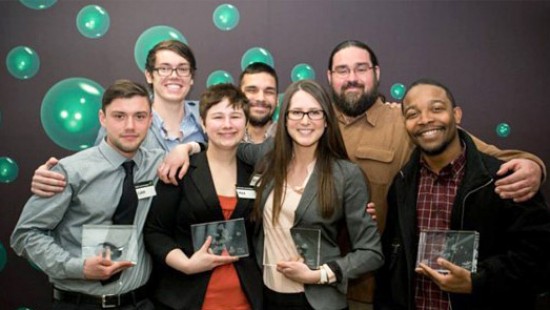Click here to read article on WMU’s website
March 30, 2015 | WMU News
KALAMAZOO, Mich.—A team of five Western Michigan University students has won the 2015 Wege Prize, besting teams from around the nation in the eyes of an international panel of judges whose task was to assess the teams’ ability to use design principles to tackle sustainability problems.
The WMU team captured first place and a $15,000 award March 28 in an event the Grand Rapids-based Wege Foundation calls a “gathering of the brightest collegiate minds in America to solve a truly wicked problem.” The second annual transdisciplinary design contest asked teams of five to work collaboratively across institutional and disciplinary boundaries to create a circular economy—a tightly looped, restorative economic cycle where resources can be re-adapted for use without limiting the desirability of products or the loss of revenue.
WMU’s team competed under the name Western Sustainers.
The WMU team
- Max Hornick, public relations major from Kalamazoo.
- Ramon Roberts-Perazza, a civil engineering major from Detroit.
- Kelsey Pitschel, a mechanical engineering major from Hartland.
- Elijah Lowry, a geography and environmental and sustainability studies major from Dearborn.
- Cara Givens, a biomedical science major from Detroit.
The WMU team designed The Local Loop Farm, an agricultural system that exists symbiotically with the surrounding community, using complementary systems to increase economic, environmental and biological effectiveness. Building on research done by WMU’s Office of Sustainability, the team used current technology for its design, including hydroponic grow beds, fish cultivation and hot composting. The increased efficiencies achieved allow for the production of fresh, healthy fish and vegetables that are affordable to the community and eliminate many of the negative effects associated with current food production and consumption.
The Western Sustainers were advised by two recent WMU grads Kyle Simpson from Novi andCarlos Daniels from Detroit, as well as Josh Shultz, who is the permaculture coordinator in the Office of Sustainability. The WMU team’s design presentation can be viewed atwegeprize.org/western-sustainers.
About the competition
The 2015 competition featured 13 teams of five students, representing a total of 12 different colleges and universities and 45 academic disciplines. Five international sustainability and design professionals returned as judges. In addition to WMU, participating colleges and universities included: Alma College, George Washington University, University of California Berkeley, Ferris State University, Grand Valley State University (four teams), Kendall School of Art and Design, Hope College, University of Michigan, Michigan State University, University of Wisconsin-Madison, Savannah College of Art and Design and Pennsylvania State University.
Second place went to a team from Kendall and Savannah College. Third place was awarded to a team made up of students from Savannah College, Kendall and Penn State.
Judges for the competition were:
- Colin Webster, education programme manager for the Ellen MacArthur Foundation, Endinburgh, United Kingdom.
- Gretchen Hooker, biomimicry specialist with Kalamazoo’s Biomimicry Institute.
- Nathan Shedroff, program chair for MBA programs at the California College of Arts.
- Ellen Satterlee, executive director of the Wege Foundation.
- Michael Werner, green chemistry and restricted substances manger for Apple.
The Wege Foundation focuses on local good works that enhance the lives of people and preserve the health of the environment. The five branches of its mission are education, environment, arts and culture, health care and human services.
For more information, visit wegefoundation.com.
For more news, arts and events, visit wmich.edu/news.
Pictured above:
Front row: Elijah Lowry, Max Hornick, Kelsey Pitschel, Carlos Daniels. Back row: Kyle Simpson, Ramon Roberts-Perazza, Josh Shultz.


